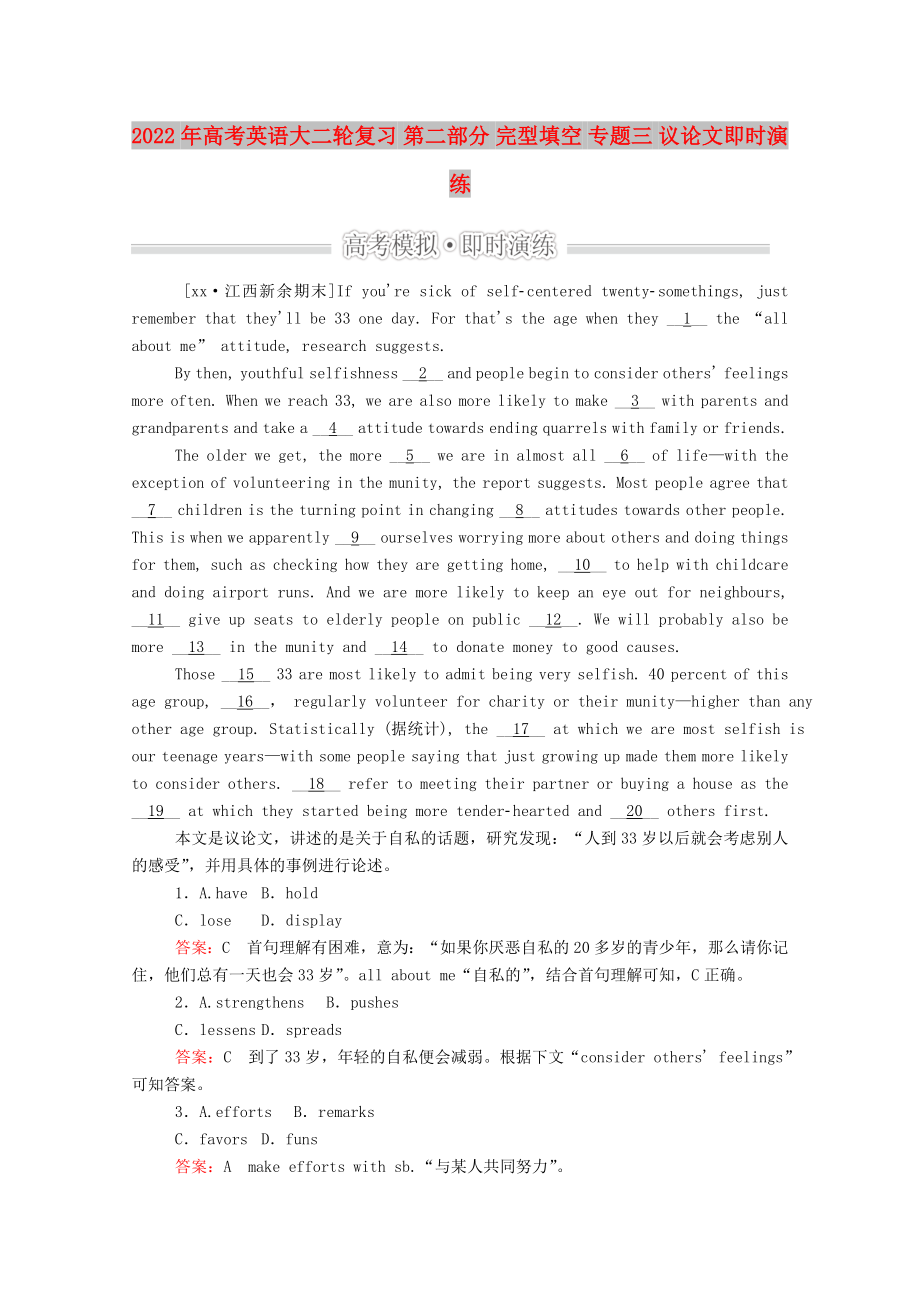《2022年高考英語大二輪復(fù)習(xí) 第二部分 完型填空 專題三 議論文即時演練》由會員分享�,可在線閱讀���,更多相關(guān)《2022年高考英語大二輪復(fù)習(xí) 第二部分 完型填空 專題三 議論文即時演練(3頁珍藏版)》請?jiān)谘b配圖網(wǎng)上搜索���。
1、2022年高考英語大二輪復(fù)習(xí) 第二部分 完型填空 專題三 議論文即時演練
[xx·江西新余期末]If you're sick of self-centered twenty-somethings, just remember that they'll be 33 one day. For that's the age when they __1__ the “all about me” attitude, research suggests.
By then, youthful selfishness __2__ and people begin to consider others
2���、' feelings more often. When we reach 33, we are also more likely to make __3__ with parents and grandparents and take a __4__ attitude towards ending quarrels with family or friends.
The older we get, the more __5__ we are in almost all __6__ of life—with the exception of volunteering in the munity
3��、, the report suggests. Most people agree that __7__ children is the turning point in changing __8__ attitudes towards other people. This is when we apparently __9__ ourselves worrying more about others and doing things for them, such as checking how they are getting home, __10__ to help with childca
4�����、re and doing airport runs. And we are more likely to keep an eye out for neighbours, __11__ give up seats to elderly people on public __12__. We will probably also be more __13__ in the munity and __14__ to donate money to good causes.
Those __15__ 33 are most likely to admit being very selfish. 40
5��、 percent of this age group, __16__���, regularly volunteer for charity or their munity—higher than any other age group. Statistically (據(jù)統(tǒng)計(jì)), the __17__ at which we are most selfish is our teenage years—with some people saying that just growing up made them more likely to consider others. __18__ refer t
6���、o meeting their partner or buying a house as the __19__ at which they started being more tender-hearted and __20__ others first.
本文是議論文,講述的是關(guān)于自私的話題��,研究發(fā)現(xiàn):“人到33歲以后就會考慮別人的感受”�����,并用具體的事例進(jìn)行論述���。
1.A.have B.hold
C.lose D.display
答案:C 首句理解有困難��,意為:“如果你厭惡自私的20多歲的青少年��,那么請你記住���,他們總有一天也會33歲”。all about me“自私的”�,結(jié)合首句理解
7、可知��,C正確����。
2.A.strengthens B.pushes
C.lessens D.spreads
答案:C 到了33歲��,年輕的自私便會減弱�����。根據(jù)下文“consider others' feelings”可知答案。
3.A.efforts B.remarks
C.favors D.funs
答案:A make efforts with sb.“與某人共同努力”�。
4.A.serious B.positive
C.negative D.equal
答案:B positive“積極的”,根據(jù)語境可知��,到了33歲����,人們會在對待問題的態(tài)度上發(fā)生改變,而且應(yīng)為積極的一面���。
5.
8����、A.selfless B.selfish
C.wise D.intelligent
答案:A “年齡越大��,人會變得更無私”�,根據(jù)文章主題可以確定答案����。
6.A.species B.classes
C.matters D.a(chǎn)reas
答案:D 在人生的所有領(lǐng)域都會是這種情況����,除了在社會做志愿工作。
7.A.having B.a(chǎn)busing
C.bearing D.loving
答案:A 通過“Most people agree”可知����,此處為大家公認(rèn)的觀點(diǎn),即:有了孩子會是改變對他人態(tài)度的一個轉(zhuǎn)折點(diǎn)��。
8.A.their B.your
C.our D.his
答案:C 根據(jù)本
9���、文講述的人稱是第一人稱����,以及“other people”可確定答案��。
9.A.deserve B.find
C.serve D.save
答案:B 該階段是我們發(fā)現(xiàn)自己開始替別人擔(dān)心的時期�,故選find。
10.A.supporting B.caring
C.demanding D.offering
答案:D 上文提到過為別人擔(dān)心���,可知�����,該空為主動的幫助照顧孩子����。
11.A.rather than B.instead
C.a(chǎn)s well as D.more than
答案:C 該部分講述的是關(guān)心他人的種種表現(xiàn),故as well as“除了……還……”����。
12.A.trans
10、port B.system
C.burden D.interest
答案:A 讓座應(yīng)發(fā)生在公交車上��,故答案選A����。transport“交通”�。
13.A.devoted B.occupied
C.involved D.concerned
答案:C 我們很可能也會更多的參與社區(qū)的一些事務(wù)。involve“牽涉�����,涉及”��。
14.A.reluctant B.willing
C.determined D.promising
答案:B 更愿意捐錢做一些善舉�,該空與本段主題相關(guān)���。
15.A.at B.beyond
C.under D.over
答案:C 上文中講述的是33歲以上的人傾向
11、于關(guān)注他人�����,而33歲以下的人承認(rèn)自己自私��。
16.A.Besides B.Therefore
C.However D.Otherwise
答案:C 上文承認(rèn)自己自私���,空后講述的是通常去慈善機(jī)構(gòu)或社區(qū)作志愿者�,故表轉(zhuǎn)折���。
17.A.stage B.way
C.call D.mark
答案:A 與at搭配的名詞為stage��,表示“在……階段”��,故應(yīng)選stage�����,意為:我們最自私的階段就是我們青少年時期�����。
18.A.Others B.Another
C.The others D.Other
答案:A 上文中提到的是“some people”�,因此,該空為others��。
19.A.key B.point
C.lesson D.situation
答案:B 其他人的觀點(diǎn)是“遇到自己伴侶或買了房子����,看作是他們變得無私,對他人熱心腸的轉(zhuǎn)折點(diǎn)”�,故選point。
20.A.rewarding B.wondering
C.taking D.putting
答案:D 上文中的and表明該題應(yīng)與前面more tender-hearted并列�����,故應(yīng)選D��。
 2022年高考英語大二輪復(fù)習(xí) 第二部分 完型填空 專題三 議論文即時演練
2022年高考英語大二輪復(fù)習(xí) 第二部分 完型填空 專題三 議論文即時演練

